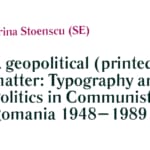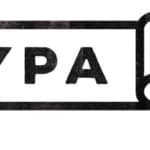 AEPM annual conference 2024
AEPM annual conference 2024
From 23rd to 25th May 2024 TYPA Centre in Tartu, Estonia hosted the annual conference of the Association of European Printing Museums (AEPM) which, each year, brings together print museums, print artists, researchers and enthusiasts from across Europe and on a global scale.
About the Conference
Print heritage, the history of communication, its life long skills and intangible knowledge are in a constant state of uncertainty. On the one hand print museums are down to the last survivors of the traditional printing trades. On the other, more and more artists and designers are taking an active role in the future of print. What does the future hold for printing museums?
How can we use our combined skills, utilise fully the collections we have and connect with audiences today? The Arts of Survival, during global uncertainty, environmental uncertainty, and heritage uncertainty are now, more than ever, the key to the future. In the face such challenges, new approaches, innovative ideas and a younger generation of enthusiasts are essential if printing and graphic heritage are to thrive.
Over three days conversations, lessons and exchanges will contribute to the active survival and exchange of knowledge in the field of graphic heritage.
Specialists in type design, print, and all aspects of historical and contemporary letterpress will discuss alternative perspectives and possible futures of the process. Demonstrations and practical activities will take place during the conference led by international and local artists and practitioners.
Date: 23 – 25 May 2024
Location: TYPA MTÜ, Kastani 48f, Tartu 50410 Estonia
The speakers
Arina Stoenescu is dedicated to bilingual children’s books (in which typography plays a central role), is captivated by book history, and has an ongoing interest in the materiality of text. She was born in 1969 in Bucharest, left Romania in 1987 and has lived in Stockholm since 1989. A graduate of Konstfack, University College of Arts, Crafts, and Design, she is now working as lecturer in media technology at Södertörn University, is a book publisher and translator and is a PhD candidate in the Department of Arts and Cultural Sciences at Lund University, Book history with the topic: Typography and politics in Communist Romania 1948–1989.
In 2010 she started the first independent type design and typography courses in Swedish higher education. She also works as designer and editor for the micro publishing house Pioneer Press with a special interest in bilingual children’s books, children’s culture, typography, and Romanian subjects. Since 2014 she has been working as a museum educator at the Skansen Open Air museum printing shop, the Officina Typographica.
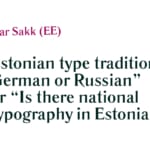
Ivar Sakk is a designer and design historian based in Tallinn. He graduated from the State Art Institute of the Estonian SSR in the field of Industrial Art in 1986, following which he worked as a freelance graphic designer in the offices of Graaf, Vaal Disain and Sakk & Sakk.
Ivar has taught at The Estonian Academy of Arts (EKA) since 2003 and served for many years as the Department Head and Professor (2005-2015). In 2012 Ivar received his PhD in Graphic Design from EKA for a dissertation on the history of typography which was published under the title Aa kuni Zz (Aa to Zz). He won a bronze medal at the 2013 Best Book Design from all over the World competition for the work.
Sakk’s design has appeared on the pages of Novum, Graphis, Print and Communication Arts, and his articles on design have been published in Sirp, Eesti Ekspress, Estonian Art, Kunst.ee and Typo. His posters have been exhibited at numerous exhibitions around the world and are included in the collections of the Victoria & Albert Museum, Toyama Art Museum, Moravian Gallery, Warsaw Poster Museum, Lahti Art Museum, Colorado State University and others.
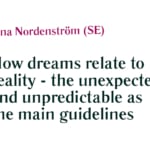
Lina Nordenström is an artist, working primarily with letterpress and artists’ books. She is based in Stockholm and Västmanland, Sweden. Since 2009 she is studio manager at GG Print Studio in the remote village Uttersberg, together with her husband and colleague Lars Nyberg. The studio runs residence programs, workshops and regularly arranges seminars on different themes connected to printmaking and artists’ books.
She is also one of the founders of the recently formed NLN, Nordic Letterpress Network, which is about to evolve. Between 2006 and 2018 she was teaching regularly, primarily at The University College of Arts, Crafts and Design and The College of Printmaking Arts in Stockholm, but also at EKA in Tallinn 2022. Since 1995 she has exhibited regularly in Sweden and internationally.
Education: Gothenburg University 1982-85, The College of Printmaking Arts in Stockholm 1989-94 and the Royal Institute of Art in Stockholm 2000-2002.
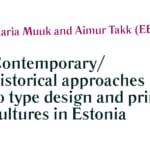
Maria Muuk is a freelance graphic designer and researcher. She holds a BA from EKA GD (2016) and an MA from the Critical Studies Department at the Sandberg Instituut in the Netherlands (2019), and is mainly practicing as an editorial graphic designer within various Estonian cultural institutions. She has been researching Estonian print design heritage since 2020, co-curating the exhibition A bdok Designer’s studio. Jüri Kaarma and late Soviet graphic design at the Estonian Applied Art and Design Museum (winner of the best temporary exhibition award 2022).
Aimur Takk is a freelance designer focusing mainly on typefaces and visual identities. He graduated from the Department of Graphic Design of the Estonian Academy of Arts (EKA GD) in 2016 and has studied type design at HfG Offenbach (2015–2016) and ÉCAL (2018–2020). Aimur has created custom typefaces for IDA Radio, Tallinn Music Week, ERKI Fashion Show and others. Together with Andree Paat, he runs the type foundry Tüpokompanii. He has been a visiting lecturer at EKA GD since 2017 and one of the initiators of the ???/qoqoqo Summer School in Estonia.
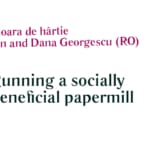
Dana and Ion Georgescu are the founders of The Paper Mill (Moara de hârtie) social economy project in Comana, Romania. The Paper Mill, together with the Comana Crafts Village, are a cultural and social project, unique in Romania, that aims at supporting the community through creative use of book-related and traditional crafts.
The Paper Mill, inaugurated in 2011 in Comana, is a living museum hosting the biggest collection of letterpress printing and bookbinding historical equipment in Romania. In 2013 they opened the only handmade paper mill built in the XXIst century.
In 2016, six more Romanian traditional crafts workshops were added, to form the Crafts Village, and since 2020 the complex has also a kitchen—a certified social enterprise—which provides food for visitors and also offers free food for vulnerable persons from the community.
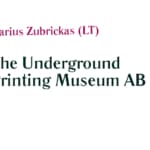
Darius is a museologist in the Department of Military History at Vytautas the Great War Museum, one the oldest museums in Lithuania. The department works on exhibitions and research of various historical data, events. Darius will be presenting with a relative of the original founder the Underground printing house “ab”, now a branch of the war museum. Established and run at great personal risk by the late Vytautas Andziulis (1930-2018) and Juozas Bacevičius (1918-1995), during the last decade of the Soviet occupation the AB Underground Printing House operated beneath a greenhouse in Andziulis’ garden on the outskirts of the city. Dug by hand between 1978 and 1980, during its lifespan the printing house published 23 clandestine titles dealing with subjects ranging from Lithuanian history to religion and poetry, all on a hand-operated machine built from miscellaneous spare parts.
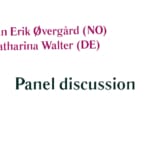
Jan Erik Øvergård (born 1955) is chairman of the Friends Association at The Press Museum Fjeld-Ljom, Røros, Norway (Pressemuseet Fjeld-Ljoms Venner). He has a background as a journalist, having begun his career in the very same newspaper house in 1973. Fjeld-Ljom was produced with standard letterpress techniques until 1975 and the newspaper house became a museum in 1986. In recent years the Friends Association have restored Fjeld-Ljom into a complete pre-digital newspaper house, being able to show the complete workflow of text and images from journalist/editor through lead-based production to a four-page broadsheet newspaper printed on an old Nebiolo machine. The Friends Association has been recruiting and training young people in letterpress techniques for some years, and was in 2023 given a grant from the EU council / EU Commission for a European project running similar training. The Friends Association have also worked in close cooperation with the National Academy of the Arts in Norway, building a bridge between traditional typography and young artists eager to use letterpress techniques in their visual expressions.
Katharina Walter has been director of the Museum of Printing Leipzig since 2023. In recent years she has worked as a cultural and media scientist for the Gutenberg Museum Mainz, the German Museum of Technology Berlin, the Berlin State Library and the Museum für Gestaltung Zürich. Her main interest lies in the history of typography as a cultural technique, in particular in the transition from lead type to phototypesetting. She holds a Master’s degree in Communication Design with an emphasis on typography and book design from the University of Applied Sciences Mainz and a Master’s degree in cultural history and theory from the Humboldt-Universität Berlin.
From 2013 till 2018 she worked as a research associate for the Cluster of Excellence Image Knowledge Gestaltung. An Interdisciplinary Laboratory at Humboldt-Universität Berlin.
Oleksii Chekal is a Ukrainian designer, typographer, calligrapher, visiting professor of Florence Classical Arts Academy, postgraduate student of Kharkiv Academy of Design and Art, employee of the Museum of Books and Printing of Ukraine. Oleksii was born in Slavyansk, studied in Kyiv and Kharkiv to become a painter and restorer of icons. Since 2000 he has worked in the graphic design studio Panic Design. Having abandoned the office principle of work, Alexey gradually turned into a traveling calligrapher, who, traveling to different countries and Ukraine as a designer, solves unusual problems at the intersection of type art, scientific, philological, religious and historical projects. Skills in the field of intercultural and interreligious relations allow us to provide services for customers from different Christian denominations (Orthodoxy, Catholicism, Protestantism), for Jewish studies and Muslim publications. Combining his work knowledge in the field of paleography, epigraphy, theology, theoestetics and art history, Alexey creates logos, inscriptions and graphic designs in different scripts: Greek, Cyrillic, Arabic, Syriac, Hebrew, Georgian, Armenian, Ethiopian. Branding of German castles, handwritten prayers of Syrian saints, design for conferences in Oxford, letterpress posters in European printing houses, covers for American scientific publications, exhibitions for Italian monasteries and, of course, calligraphy for Ukrainian books — all this is within the range of capabilities of the Ukrainian designer.
Valentyna Bochkovska, historian and Ph.D. Doctor of Philosophy. As the Director of the Museum of Book and Printing of Ukraine since 2008, she has curated numerous art projects, exhibitions, and literature festivals, enriching the nation’s cultural heritage. Bochkovska has participated in various prestigious international programs such as the International Visitor Leadership Program in 2009 and her Fulbright scholarship in 2016-2017. As well as the AAM International Conference in 2017 and the AAM International Virtual Conferences in subsequent years.
Her commitment to preserving and promoting Ukrainian literary treasures is exemplified through her curatorship of over 40 museum exhibitions and her role as co-author of significant books documenting the country’s printing history. Notably, she spearheaded the Ukrainian Book Festival for children, an annual celebration since 2010. Bochkovska initiated the innovative “Virtual Museum of Book and Printing of Ukraine” project. Her affiliations with esteemed organizations like the Gutenberg Brotherhood and her role as an expert for the Ukrainian Cultural Foundation underscore her stature in the cultural sphere.
UPUPÆPOP (CZE)
Artist demonstration
Upupæpop is a visual design and letterpress studio from Hradec Králové in the Czech Republic, created by Eva and Jakub Horský.
Eva works with a wide range of techniques, which result in varied forms of book, commercial and free illustrations. She is a sought-after illustrator not only for children’s books, but also for interior elements and visual applications in the space. Jakub is a graphic designer, straddling the worlds of traditional graphic techniques and contemporary digital publishing. In his work, he tries to constantly connect these two worlds and look for creative outlets and technological combinations in them.
Since 2014, they have been performing under the common name Upupæpop. Their portfolio includes collaborations with large festivals and cultural events as well as small realisations for fun. Their letterpress workshop is an independent experimental space for traditional printing and low-tech production from paper and fabrics. An island of analog freedom, haptic experience and slow thinking. Both are also teachers at the Department of Fine Arts, at the Faculty of Education of the University of Hradec Králové, where they share their skills with their students and try to infect the future generation of artists and art teachers with their enthusiasm.
Jorgen Loot (EE) and Ian Gabb (UK)
Linotype-Monotype demonstration and workshop
Ian Gabb, aka The Letterpress Monster, is a trained graphic designer and is currently the letterpress technician at the Royal College of Art in London. Ian is passionate about the Monotype casting system and spends his free time traveling to various locations around Europe helping to maintain and run Monotype casting machinery. He is a frequent visitor to the Tipoteca in Italy and works with Patrick Goossens in his collection in Antwerp, Belgium. Recently he has assisted with getting TYPA’s Monotype caster into working order, after over thirty years of inaction. Aside from that, Ian is what might be called a vinyl junkie, being the proud owner of a sizable, and eclectic record collection.
